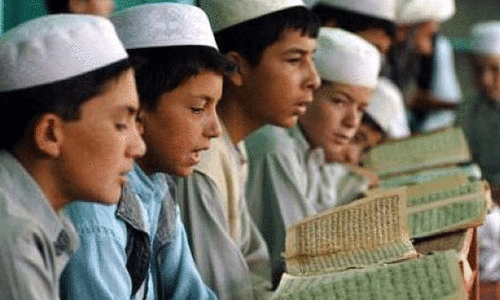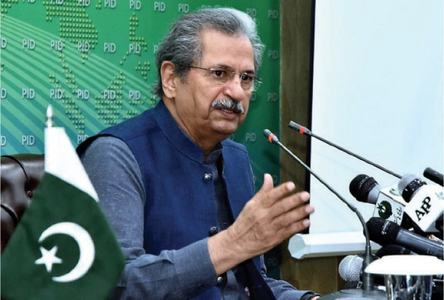• Clerics, students protest against ICT Waqf Properties Act
• Vow to boycott registration process
• Minister optimistic registration will go ahead
ISLAMABAD: Like in the past, religious segments have succeeded in applying brakes to the process of streamlining seminaries and entangling the incumbent government in legal and official lacunas.
This is evident from the fact that out of around 30,000 madressahs that exist in the country, only 295 have applied for registration.
However, Education Minister Shafqat Mehmood seemed optimistic about the registration process.
Talking to Dawn, Mr Mehmood said: “Things take time; they (seminaries) have given us assurance in writing, therefore, registration will be done and we will get it done.”
Madressah reforms were initiated in 2003 but subsequent governments remained unsuccessful in enforcing them and failed to streamline the affairs of seminaries, including their sources of funding and list of students. They have even not been able to check the rampant practice of building madressahs on government or private encroached land.
On Tuesday, clerics and seminary students came out on the streets against the enactment of Islamabad Capital Territory Waqf Properties Act, 2020.
Staging a protest outside the National Press Club, speakers claimed that the government had backstabbed them and announced that they would continue boycotting the registration process.
Belonging to various seminary boards, the protesters said the law was a move to violate their integrity.
The clerics have even set up a group under the name of Tehreek-i-Tahaffuz-i-Masajid-o-Madaris Islamabad, led by a senior member of one of the seminary boards.
The organisation was of the view that the Wafq Act was un-Islamic and was aimed at changing the ideological status of the country, adding that similar laws were in place in secular countries, like Egypt and Turkey.
The speakers said the relevant authorities had promised to amend the Waqf Properties Act, but they had failed to do so. They warned that until the necessary amendments were made, they would not register the seminaries.
The Waqf Properties Act became a law on Sept 24, 2020 as part of FATF requirements after several months of deliberations.
However, the seminary boards took up the matter on Oct 2, 2020 only after the education ministry advertised in national dailies that the madressahs should get registered in their respective districts.
On the other hand, the top leadership of the five mainstream seminary boards held a meeting in Lahore on Monday under the banner of Ittehad-i-Tanzeemat Madaris Pakistan, and decided to submit suggestions to the government on the registration of seminaries.
“We have observed that the government has not finalised the roadmap for registration of madressahs, therefore, we will present our suggestions to expedite the process,” said Wafaqul Madaris Al Shia General Secretary Allama Afzaal Haidari.
He said another meeting with the education minister was expected soon.
Led by Mufti Muneebur Rehman, the Ittehad-i-Tanzeemat Madaris Pakistan is a collective body of five seminary boards. The boards represent the four mainstream schools of thought — Barelvi, Shia, Deobandi and Ahle Hadith — while the fifth affiliates seminaries of Jamaat-i-Islami.
A senior official of the education ministry, on condition of anonymity, said the seminaries had successfully evaded efforts to streamline and register themselves for decades.
“The idea to register madressahs was initiated in Gen Ayub Khan’s era when the Auqaf departments were formed, but the clerics established these five boards and claimed that all seminaries were managed by them,” he said.
The official said the initiative was then taken up by Gen Pervez Musharraf’s government in June 2001 with the formal registration process commencing in 2003.
“But, this time again, the madressah officials evaded the authorities,” the official said, adding that the matter came to the forefront again following the terrorist attack on Army Public School in Peshawar in December 2014.
The official said several rounds of negotiations were held with the Ittehad during the next four-and-a-half years and eventually an MoU was signed between the Ministry of Federal Education and Ittehad Tanzeematul Madaris Pakistan on Aug 29, 2019.
“The MoU was signed after serious negotiations, but now the Ittehad’s demand that a roadmap be prepared for its implementation is only an excuse and a misleading statement,” the official added.
Between August 2019 and October 2020, the education ministry established the Directorate General of Religious Education (DGRE). To facilitate the registration process, 16 regional offices were set up by the DGRE in Multan, Lahore, Rawalpindi/Islamabad, Karachi, Sukkur, Hyderabad, Peshawar, D.I. Khan, Swat, Quetta, Loralai, Khuzdar, Muzaffarabad, Mirpur, Gilgit and Skardu.
These centres were also responsible of assisting the registered madressahs to open their account in scheduled banks. As many as 133 focal persons affiliated with the relevant deputy commissioner offices have been nominated in each district across the country.
After completion of basic work, announcement was made that the process of registration of all madressahs in the country would start from Oct 5, 2020. But on Oct 2, 2020, the Ittehad directed all seminaries to wait for further instructions on the registration process.
It is estimated that there are around 30,000 seminaries across the country. But since August 2019, after the signing of the MoU, only 1,957 forms had been disseminated, 295 submitted with the Directorate General of Religious Education (DGRE), Ministry of Education and only 140 seminaries have been registered in the country.
On the other hand, sources in the Ittehad said the recent meeting held in Lahore noted that education was a devolved subject after the 18th Amendment and the role of the federal education ministry to register religious education institutions was illegal.
It shows that the clerics have already prepared the next course of action to block the registration of seminaries during the remaining tenure of this government by delaying it through courts.
Published in Dawn, January 27th, 2021














































